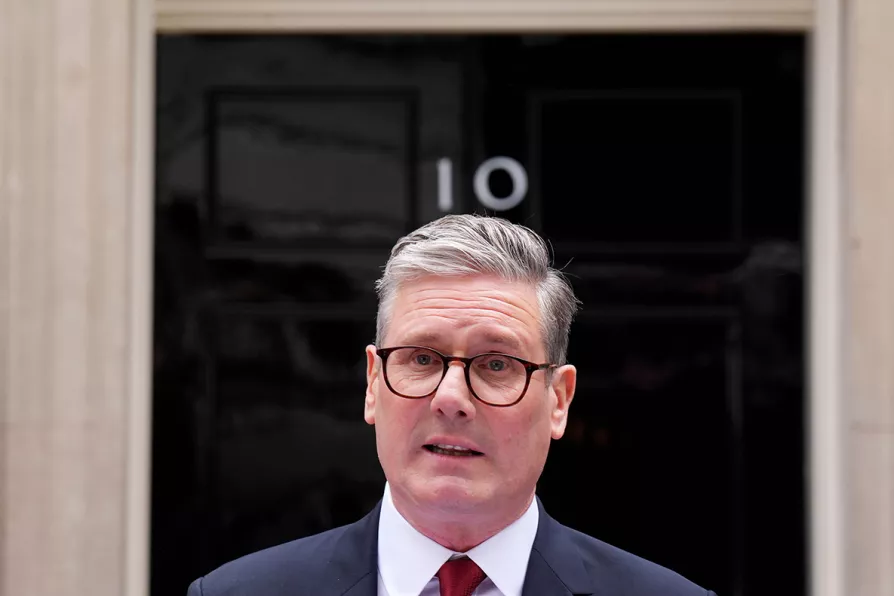Hundreds protested against the US-Israel attacks on Iran in Parliament Square on Saturday, fearing a wider conflagration and horrified by the targeting of young schoolchildren, writes LINDA PENTZ GUNTER

 Newly elected Prime Minister Sir Keir Starmer gives a speech at his official London residence at No 10 Downing Street for the first time after the Labour party won a landslide victory at the 2024 General Election, July 5, 2024
Newly elected Prime Minister Sir Keir Starmer gives a speech at his official London residence at No 10 Downing Street for the first time after the Labour party won a landslide victory at the 2024 General Election, July 5, 2024
ON JULY 4, the Keir Starmer-led Labour Party won the biggest Westminster majority of seats (174) since 1997 and the second biggest since national government coalition victories in the 1930s. Which factors produced Labour’s so-called “landslide?”
First, the collapse of the Tory vote: it fell from 14 million in December 2019 to seven million, from 44 per cent of the poll to 24 per cent, with the loss of 223 seats. The sharpest decline occurred in Brexit-supporting constituencies.
Second, the rise of Reform UK. Nigel Farage’s private limited company far exceeded the 644,000 votes in 2019 for his Brexit Party, which fought fewer than half the seats in order to help Tory candidates. Reform UK plc won four million this year (more than the Liberal Democrats) and took five seats from Tories.
In addition, Reform’s intervention cost the Tories up to 180 seats, most of which were gained or retained by Labour.
Third, the revival of the Lib Dems: not so much in votes (3.5m) or poll share, but in seats won — from 15 to 72 — most at Tory expense.
Fourth, the collapse of the SNP: losing one-third of their poll share and 39 of their 48 seats, 36 of them to Labour.
With the right-wing vote split more substantially than at any time since the end of the first world war, and the resurgent Lib Dems attracting Tory votes in southern England in particular, the first past the post system enabled Labour to win an extra 206 seats.
This occurred even though Labour’s vote this year (9.7 million) under Keir Starmer’s leadership was more than half a million lower than in 2019 (10.3 million) and more than three million lower than in 2017 (12.9 million).
While a lower turnout meant that Labour’s share of the poll rose slightly on July 4, Labour’s vote as a proportion of the overall electorate has fallen from 28 per cent in 2017 and 22 per cent in 2019 — both under Jeremy Corbyn’s leadership — to 20 per cent on July 4.
In these circumstances, despite a resolution at the 2022 Labour Party Conference, it is difficult to see Keir Starmer’s government agreeing any moves to a PR voting system for the Westminster parliament.
Labour today occupies almost two-thirds of the seats with just one-third of the popular vote. The Tories are only slightly over-represented this time, while the Lib Dems enjoy proportionality.
But Reform UK with 14 per cent of the votes and the Greens with 7 per cent are grossly under-represented in what is the biggest mismatch between votes and seats since equal suffrage was achieved almost a century ago, in 1928.
As a matter of democratic principle, the Communist Party continues to argue for a genuine system of proportional representation, our preference being for the Single Transferable Vote in multimember constituencies.
A shallow and fragile mandate
Clearly, the defeat of the Tories and the election of a Labour government was the most important feature of this year’s general election.
The Communist Party welcomes this outcome on the basis of our main resolution at the 57th Party Congress last November. We said such a result would most likely raise the morale, expectations and demands of the working class and the labour and progressive movements.
We must now — together with our friends and allies — work to make that desired outcome a firm reality.
We also have to recognise that this Labour victory and Starmer’s new administration rest on a shallow and fragile base. This means, among other things, that the demand to fight for left and progressive policies from this Labour government cannot be postponed until a second term that may never arrive.
The continuing decline in election turnouts (from 69 per cent in 2017 to 62 per cent in 2019 and 60 per cent this July), which is especially pronounced in older industrial and traditionally pro-Labour areas, confirms the experience of many of our own 14 candidates and election teams in working-class communities: namely, that people’s hostility towards the Tories was not matched by any level of enthusiasm for Starmer’s Labour and its vague or feeble social and economic policies.
Millions of working-class people and their local communities do not believe that today’s Labour Party represents their interests as individuals, families, communities and as a class.
The Labour leadership argued that bolder policies would repel potential so-called “middle-class” and Tory and Lib-Dem supporters.
Yet every opinion survey in recent years has shown majority support across our society for such left and progressive policies as higher taxation of personal wealth and corporate profits, a transaction tax on financial speculation, a cap on bankers’ bonuses, public ownership of the utilities and Royal Mail, pension justice for women, an end to charitable status for private schools and more public investment in health, council housing, public transport and green energy.
These are vote-winning policies, not vote losers.
Whose Labour Party?
Starmer’s Labour has rejected them because the party’s new leadership is continuing its drive to change the whole basis, orientation and character of the party founded by working class and socialist organisations at the dawn of the 20th century.
Labour’s boldness can be seen, however, when it comes to foreign and military affairs. There is no room for argument here — or in Britain’s ruling class media — about devotion to Nato, support for US wars and Israeli genocide, the ongoing military encirclement of China, increased armaments spending and a major expansion of Britain’s nuclear weapons arsenal.
Strengthening the peace and anti-war movement must be a top priority for the Communist Party’s political work over the coming period.
Of course, there is nothing new about a Labour government’s subservience to the requirements of British imperialism around the world.
What is novel is such craven capitulation to the requirements of finance capital even before taking office.
We have seen how swiftly and cynically Starmer has abandoned progressive policy pledges since his elevation to the party leadership in 2020.
He and his collaborators have purged left-wing MPs and activists on an unprecedented scale. Safe, conformist and careerist disciples of the “project” have been parachuted into safe Labour seats with the connivance of retiring MPs.
On June 17, shadow chancellor Rachel Reeves addressed a breakfast gathering of company executives — including the bosses of Barclays, BT, Glaxo-Smith-Klein, Lloyds and Santander — about the party’s manifesto: “I really hope that when you do read it, or if you read the section on the economy, that you will see your fingerprints all over it.”
Not surprisingly, corporate and individual donations to the Labour Party overtook trade union contributions in 2022 and are now racing ahead. Last year, with £14.6 million, the rich and big business gifted more than twice as much as the unions to Labour.
This is part of the wider takeover of Establishment politics by big money, with financial donations to political parties almost doubling last year to £93 m. In the first three weeks of the 2024 general election campaign, parties received over £12m, two-thirds of it going to Labour, with wealthy donors outspending the unions by three-to-one.

Morning Star Wales reporter DAVID NICHOLSON analyses polling for the Senedd election — and it’s bad news for Welsh Labour

In the run-up to the Communist Party congress in November ROB GRIFFITHS outlines a few ideas regarding its participation in the elections of May 2026

From Gaza complicity to welfare cuts chaos, Starmer’s baggage accumulates, and voters will indeed find ‘somewhere else’ to go — to the Greens, nationalists, Lib Dems, Reform UK or a new, working-class left party, writes NICK WRIGHT

With Reform UK surging and Labour determined not to offer anything different from the status quo, a clear opportunity opens for the left, argues CLAUDIA WEBBE











